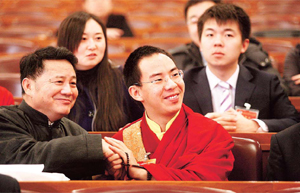Putting a pressing issue in its place
By Jules Quartly (China Daily)
Updated: 2010-03-12 07:11
Car, wife, child, money and house.
These are the five things that most people aspire to. There is even an old Chinese saying that has been adapted to the times and sums up the ideal: "wu zi deng ke".
While the first four items on the list are pretty much taken care of in contemporary China as a result of economic growth since reform and opening up in 1978, the latter is a more pressing issue.
This was graphically portrayed in the popular soap opera Dwelling Narrowness, which was controversially dropped by Beijing Television halfway through its run.
As often happens, it became even more popular after it was allegedly banned because it had touched on such a raw nerve, and DVD sellers did a brisk trade in pirated discs. Most of the country will, by now, have seen the series and sympathized with its protagonists.
They are an ordinary couple who live in a tiny rented apartment who dream of buying a house but are unable to afford one. The wife's sister sacrifices true love in order to have an affair with a government official, who helps the couple realize their ambition.
It is powerful stuff if you are in the same position, which hundreds of millions are. An online survey by www.people.com.cn found 60 percent regard themselves as "Wojuzu", or "snail house dwellers". In the same poll, 85 percent said they want strong measures to provide affordable housing.
China's average house price last year was 4,600 yuan ($674) per square meter, an increase of 27.8 percent from 2008, Xinhua News Agency reported. At the same time, Goldman Sachs figures suggest house price increases have outpaced income by 30 percentage points in Shanghai and 80 percentage points in Beijing.
What these statistics mean is that even couples who earn a reasonable wage, combine their incomes, save diligently and work for years cannot afford to get on the first rung of the housing ladder.
They are at the mercy of landlords and their money disappears into their pockets, making the rich richer and keeping the poor poor.
The result is an expanding middle class frozen out of the country's economic development, unable to progress, trapped in a low-rent situation. The position of migrant and low-wage workers is even more desperate.
Dissatisfaction with the situation is understandable and the social implications hardly need pointing out.
The answer would appear to be: Build more homes, especially low-cost housing, keep the construction industry busy and the economic juggernaut going.
This is happening to some extent and the government put 55.1 billion yuan ($8 billion) into low-cost housing projects last year. The result was forced demolitions of hutong and old neighborhoods to make way for new apartments.
This inevitably led to criticism in some quarters, from those who felt the past deserved to be preserved, and others who believe developers and officials are taking advantage of the situation to make huge profits.
A firm but balanced approach is required.
(China Daily 03/12/2010 page7)


